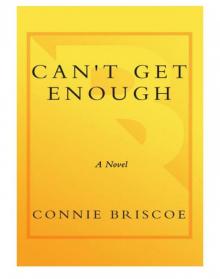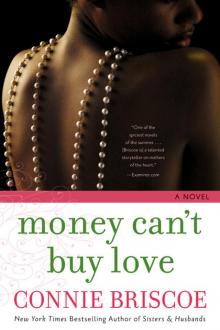- Home
- Connie Briscoe
Money Can't Buy Love
Money Can't Buy Love Read online
Begin Reading
Table of Contents
Reading Group Guide
Copyright Page
In accordance with the U.S. Copyright Act of 1976, the scanning, uploading, and electronic sharing of any part of this book without the permission of the publisher constitute unlawful piracy and theft of the author’s intellectual property. If you would like to use material from the book (other than for review purposes), prior written permission must be obtained by contacting the publisher at [email protected]. Thank you for your support of the author’s rights.
Prologue
Lenora stood above the polished chrome faucet in her master bathroom, razor blade held firmly in one hand, and thought of slashing her wrist. She had just stumbled through the most turbulent year of her life, filled with highs and lows, ups and downs. And now she was at the bottom of the pit. Her fiancé had dumped her, her girlfriends had deserted her, and her brand-new BMW had been repossessed. Last month she had to give up her prized photography studio because she could no longer pay the mortgage.
And just now she got the news she dreaded most of all. The bank was going to foreclose on her beautiful five-thousand-square-foot, million-dollar dream house. After months of receiving default notices and frantic calls to the lender begging for time and patience, she had been served with the papers that morning. Every time she thought her rotten life couldn’t possibly get any nastier, it did.
Lenora’s eyes shifted back and forth between the sharp edge of the blade and her bare brown wrist. Go on, you pitiful bitch. Go on and end the misery right now. You’re beyond feeling pain anyway at this point.
She squinted and touched the blade to her skin. The sharp prick jolted her eyes open. She grimaced. Maybe this isn’t the answer to my troubles after all, she thought. As bad as things had become, taking her life was something she could not bring herself to do. She was afraid to go on living, but she was terrified of death.
She lowered her arm and placed the razor blade on the countertop just as the front doorbell rang. “Shit!” she muttered as she pushed her dark unkempt shoulder-length hair back off her face and stared at her puffy eyes in the mirror. Who else would disturb her at 9:30 a.m. on a weekday morning? She had no job, no friends, no man. They had taken her car and her house. So now what the hell?
The bell chimed again, and Lenora dragged her bare feet across the ceramic tile floor to the carpeted master bedroom suite. Paws, her white-haired Lhasa apso, scurried from her doggy cot near the fireplace and bounded down the stairs as Lenora grabbed a dingy terry-cloth robe from the foot of her unmade bed.
Downstairs in the foyer, she peered through the glass on the double front doors to see a petite blond woman standing on the threshold. The woman’s hair and jacket were damp from a steady, unrelenting rain that had been falling all morning, and she had an anxious expression on her thin face. Lenora knew instantly that this was another pesky reporter, and she was tempted to turn around and flee back up the stairs. But the woman had already seen Lenora, and her eyes pleaded to be allowed inside.
Lenora cracked the door open.
“Hi. Are you Lenora Stone?” came the woman’s voice beneath the patter of rain on the pavement.
“Who’s asking?”
“My name is Donna Blackburn. I’m a reporter with the Baltimore View. We’re doing a roundup of people who won a million dollars or more in the Maryland Lottery over the past few years. A feature with the theme ‘Where are they now?’ ” Donna held a business card in her outstretched hand.
“So I figured,” Lenora said with impatience, pushing the card away. “You’re the umpteenth reporter wanting to talk to me since I won last year. Most of them had the decency to call first.”
“Sorry, but I couldn’t get through to you. I don’t have your landline number and your cell is, um, discontinued.”
That’s when Lenora remembered that her cell phone service was disconnected a few days earlier; she hadn’t paid that bill either. Still, she didn’t feel like talking to any damn reporters. She was a photographer herself and had worked around a ton of them. She knew how persistent they could be. How they would dig into your personal stuff if you let your guard down for even a minute. Then they would go out and blab your business to the entire world.
“I’ve said all I have to say,” Lenora said. “Go away.”
“I won’t take up much of your time,” Donna pleaded. “You won five million dollars in the Maryland Lottery almost a year ago, and I’ve heard about some of your recent misfortunes.”
“You and everyone else,” Lenora said sarcastically.
“It would give you a chance to air things out if we talk.”
“Sorry, I’m all fucking aired out.” Lenora stepped back and reached for the doorknob.
“Sure you don’t have just a few minutes?” Donna asked as her eyes darted around the room behind Lenora. Lenora could tell that the reporter had noticed that the large foyer and living room were practically bare, with no furniture, no lamps, no memorabilia. Lenora had sold all of that in a futile attempt to stay afloat. The reporter’s expression had changed from mild curiosity to eagerness as she suddenly sensed a much bigger story than the one she imagined when she knocked on the door.
“Yes, I’m sure,” Lenora responded and hastily began to shut the door.
Donna stuck a damp shoe in the crack, and Lenora glared at her, ready to punch this interloper smack in the mouth. How dare she intrude so brazenly! Lenora knew that she might be about to lose the house, but right now it was still hers. “Bitch, who the hell do you think you are coming in—”
“I’ll treat you to dinner,” Donna blurted out. “Steak, seafood, pasta. The restaurant of your choice.”
Lenora paused at the mention of free food at a real restaurant, not a quickie meal at McDonald’s or a bag of stale chips in her bed. Lenora considered herself a bit of a foodie, so this was like promising drugs to a junkie. Lenora had a sneaking suspicion that the reporter somehow knew this, that she had discovered this tidbit in her research. She pulled her robe tighter around her bulging waistline and cracked the door wider.
“Legal Seafood in Baltimore,” Lenora said, thinking of one of her favorite seafood restaurants. She could already taste the steamed littleneck clams.
“You got it,” Donna said. “But you have to be open with me. Answer all my questions. We do the interview here first, then go to dinner later this evening.”
Lenora glanced down at her bare feet on the cold slate floor of the foyer, the place where an antique Oriental carpet once lay, until she sold it on eBay last month. She was still tempted to turn the reporter down. Even a nice seafood dinner in Baltimore might not be enough to compensate for having to relive the most traumatic months of her thirty-eight-year life. She wanted to forget everything that had happened, not rehash it. She wanted to banish the lottery, Gerald, Ray, Alise, the house, and the studio from her mind forever. But the thought of staying alone inside these half-empty rooms just after getting a foreclosure notice was even more depressing.
Lenora opened the door. “Come on in. Find a chair and give me a minute to get decent.” She needed to shower, something she had not done for a few days. There had been no need since she had not left the house or seen anyone.
“No problem,” Donna said as she stepped eagerly through the doorway.
Fifteen minutes later, Lenora and Donna were seated across from each other in the kitchen, the dream kitchen Lenora knew she was going to lose soon. It had everything—travertine flooring and granite countertops, a Viking range and two sinks. They sat at the kitchen table, the only piece of furniture Lenora had left besides her bed, and nursed two mugs of hot instant coffee. A couple of months ago, Lenora sold her nine-hundred
-dollar coffee and espresso machine on eBay for a fraction of what she’d paid for it, and she had learned to tolerate the microwave variety of coffee.
Lenora now saw the extravagant coffeemaker as one in a long series of greedy, foolish decisions that she had made over the past year after winning the lottery. Her ex-fiancé Gerald had warned her to slow down. “Five million dollars won’t last forever with you spending like this,” he said repeatedly. Lenora now wished she had listened to him about the money and a whole lot more.
“So, tell me what’s happened with you since you won five million dollars in the lottery,” Donna said.
Lenora sighed. “Long story short, I fucked up everything, that’s what happened.” She twisted her lips. “But you don’t want the short version. You want the whole sad story.”
Chapter 1
One Year Earlier
Lenora’s eyes opened and shot toward the clock. “Oh, no!” she yelled, springing up from the bed. She had done it again, slept straight through the alarm going off at seven a.m. on a workday. What was wrong with her?
Paws, the one-year-old Lhasa apso she had rescued from the dog pound a few months earlier, ran to the bed and wagged her tail in anticipation as Lenora tossed the covers aside. She gave Paws a quick pat, stuck her feet into slippers, and raced across the floor of her two-room condominium. Her boss was going to kill her for being late to work again, she thought as she entered the bathroom and sat on the toilet. Why was she having so much trouble getting out of bed these days? Late-night drinks with her boyfriend Gerald were no excuse.
She grabbed her toothbrush from the holder and quickly applied toothpaste. There was a time when she would never have stayed out until two a.m. on a weeknight. Her job had been too important to her to allow that. But she was starting to get supremely frustrated with work, especially with Dawna Delaney, the new managing editor at the Baltimore Scene magazine, and a woman whose middle name should be “evil.”
So she found herself needing more time to wind down in the evening, more time to chill with her boyfriend or hang out with her girlfriends. Still, she had a mortgage on the condo and a gazillion other bills to pay. She definitely could not afford to do idiotic things like making her boss angry by repeatedly being tardy for work.
She slipped in and out of the shower in two minutes. She had no time for makeup other than a dash of lipstick. That was just as well. She hated putting the stuff on anyway. It was only because she was thirty-seven years old and starting to see a few lines around her mouth that she bothered at all. Some women craved jewelry; others makeup, shoes, or clothes. Her thing was freedom from all of that nonsense.
And food, she thought as she quickly grabbed a pair of baggy cargo pants from the closet, one of only a few pairs that still fit. She muttered obscenities as she squeezed them over her hips. One of these days she was going to admit to herself that her five foot, four inch frame was no longer a size six or even an eight and buy clothes that fit properly, she thought as she tugged at the zipper and squeezed the snap. This was why she avoided shopping as much as possible. She hated looking at her short, roundish figure in a mirror. People often told her she had a cute face but rarely commented on anything below the neck, unless it was to suggest that she needed to lose a few pounds.
Slacks or jeans were customary for her, and not just because of her weight. As a photographer for a city magazine, she needed the freedom to bend over, climb, kneel, or do whatever a photo shoot demanded without snagging some nice designer fabric on a nail or having to worry about anyone’s trying to sneak a peek up her skirt.
Today she added a loose-fitting berry-colored top to disguise her bulges. Then she glanced at her watch and muttered more obscenities at the late hour as she grabbed her black camera bag off the chair near the small desk in the living area. Her morning commute into Baltimore was at least a forty-minute drive during rush hour. She didn’t have time for breakfast, not even a glass of juice, which was just as well, she thought, given that she should be on a diet anyway.
She ran to the door and was about to open it when she looked down and saw Paws staring up at her with those big brown puppy-dog eyes. “Dammit!” she said aloud. She had to walk the poor dog or Paws would pee all over the condo. Lenora dropped her camera bag on the couch and quickly put the leash on her dog. “C’mon, sweetie,” she said as she opened the door. Paws followed happily as Lenora ran down the back stairs of the two-story building and across the parking lot to a grassy field.
“Hurry and do your thing, girl. You want me to be able to buy your dog food, don’t you? That means I gotta get to work.” Paws seemed to understand and quickly carried out her business. Then they both ran back up the stairs. Lenora dashed into the kitchen, filled Paws’s water bowl and scooped some dry dog food into her dish, patted the pooch on her furry little head, and ran back out. In the parking lot, she slipped behind the wheel of her ten-year-old Honda just as her cell phone rang. She dug into the side pocket of her camera bag, pulled out the phone, and saw from the number that it was Dawna.
She agonized over whether to answer for a second, then tossed the phone onto the passenger seat next to the bag. She knew what Dawna wanted—to know why the hell she was already more than an hour late for work. Again. And frankly, Lenora didn’t want to hear all the snapping and cussing, which for Dawna went with having her morning cup of coffee.
Lenora would take her licks when she got to the office. Dawna wouldn’t fire her—at least Lenora didn’t think so. Good photographers were hard to come by, and Dawna, who started at the Baltimore Scene only six months ago, was eager to make her mark at the magazine. Lenora had been there for seven years now and Dawna needed her. Yet Lenora realized that she couldn’t continue to press her luck.
She turned the key in the ignition and the worst thing possible happened. The crappy car didn’t start. It made some strange noises, sputtered pitifully, and then died. Lenora held her breath and tried again. Same thing. She smacked the steering wheel. She couldn’t believe this was happening to her. One of these days she was going to win the lottery. Or get that boyfriend of hers to marry her. With two incomes, she wouldn’t have to freak out about losing her job and her only source of income.
The cell phone rang, and Lenora could see that it was the boss calling again. It took every ounce of her willpower not to grab the blasted phone and fling it out the window. Instead, Lenora closed her eyes, took a deep breath, and turned the key again.
Chapter 2
Yes!” Lenora yelled when the engine turned over. One day real soon she wasn’t going to be so lucky. Her commute between Columbia, Maryland, and Baltimore was over twenty miles each way. The clunker was more than ten years old, and she had already cranked out a hundred thousand miles on it. But there wasn’t a whole lot she could afford to do about that right now. The payment on the adjustable rate mortgage for her condo had recently increased, and the last thing Lenora wanted was to lose her very first home after living in it for barely four years.
The condo wasn’t all that much, just one large living area with a separate kitchen and bathroom. But it was hers. The minute she saw the units going up near the mall, Lenora knew she had to have one. She barely qualified, but with a little creativity, the loan officer had managed to set her up with an adjustable rate mortgage that she could afford.
Then the monthly payments shot up, the economy crashed, and reality came knocking at the door. The magazine was struggling to hold on, and Lenora didn’t get the raises she had expected over the past couple of years. It was a struggle to make her monthly payments. The worst was that she couldn’t sell. Because of the recent crash in the housing market, she now owed more on the condo than its current value.
She pulled onto the highway, headed for the office in downtown Baltimore, and ran through possible stories for Dawna. By the time she pulled up in front of her building, she still hadn’t come up with a decent reason for being so late. She had already used every excuse known to womankind, some of which were really crea
tive. Like Paws vomiting all over her clothes just as she was about to walk out the door or waking up to discover that her boyfriend had accidentally taken her car keys home with him the night before.
She grabbed her camera bag and phone and ran into the building. She tapped her foot impatiently while waiting for the slowpoke elevator. “C’mon, c’mon,” she muttered. The thing finally appeared, and she hopped on and pressed the button for the fourth floor, praying that it would not stop before it got there. No such luck. It ground to a halt at the second floor, and a silver-haired woman using a walker smiled and stepped in slowly. Naturally, Lenora thought, gritting her teeth and rolling her eyes upward. It never failed. Whenever she was rushing about, a slower driver got in front of her on the road or an elderly person dragged his or her feet onto the elevator.
Then Lenora mentally shook her head at herself. Why was she acting like such a bitch? Her tardiness certainly wasn’t this woman’s fault. Lenora put her hand out to hold the doors open as the woman settled in. “What floor?” Lenora asked.
“Third,” the woman said, smiling in appreciation.
Lenora smiled back and pressed three. When the elevator stopped, Lenora patiently held the doors open as the woman got off. Then Lenora took a deep breath as the doors shut and the elevator climbed to the fourth floor. As soon as the doors opened again, she darted across the foyer and through the double glass doors of the entry to the Baltimore Scene. She was about to turn down the hallway toward her office when Jenna, the orange-haired, multi-tattooed receptionist sitting in the foyer, looked up from her paperback horror novel and beckoned with a black-polished fingernail.
“Dawna is looking for you,” Jenna said. “She wants to see you, like, yesterday.”
Lenora nodded and backtracked. She licked her forefinger and held it in the air, a signal that much of the staff used to get a reading of the boss’s mood from Jenna.

 Can't Get Enough
Can't Get Enough P. G. County
P. G. County Sisters and Husbands
Sisters and Husbands Money Can't Buy Love
Money Can't Buy Love